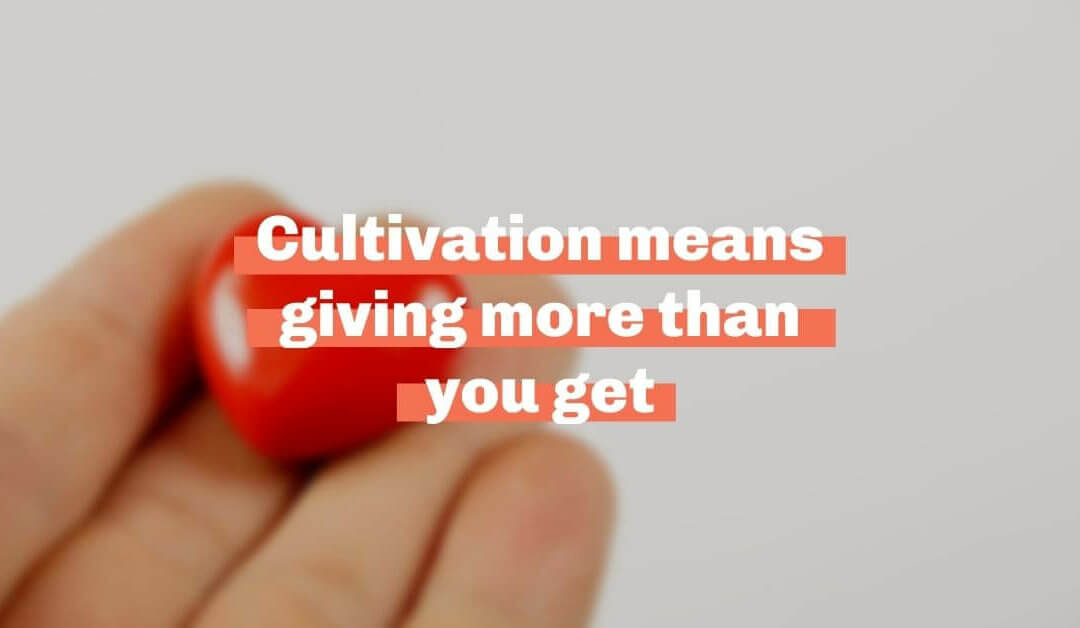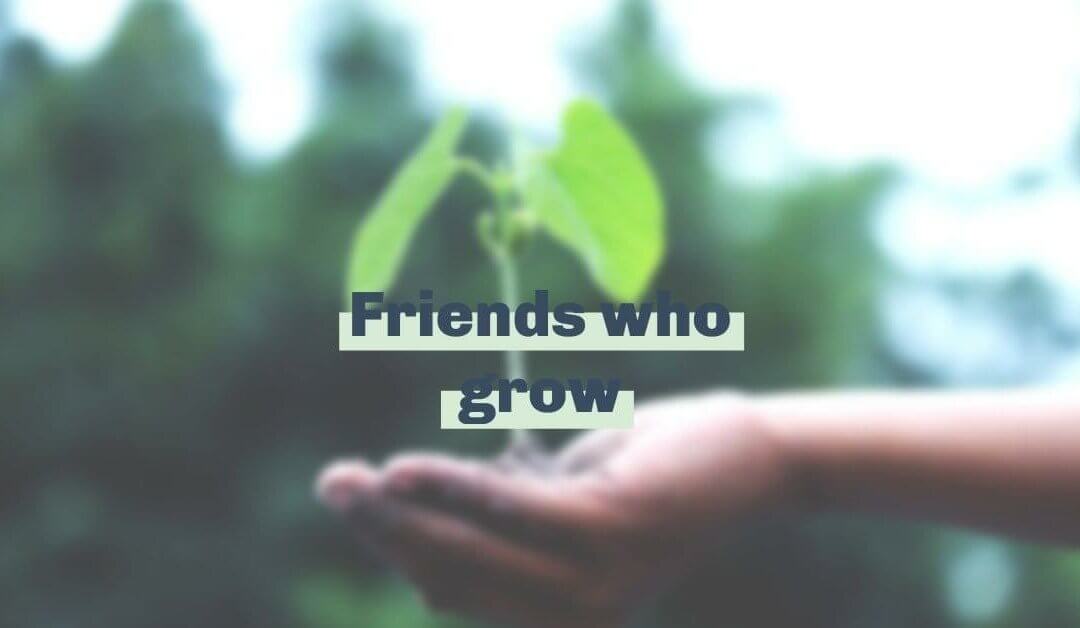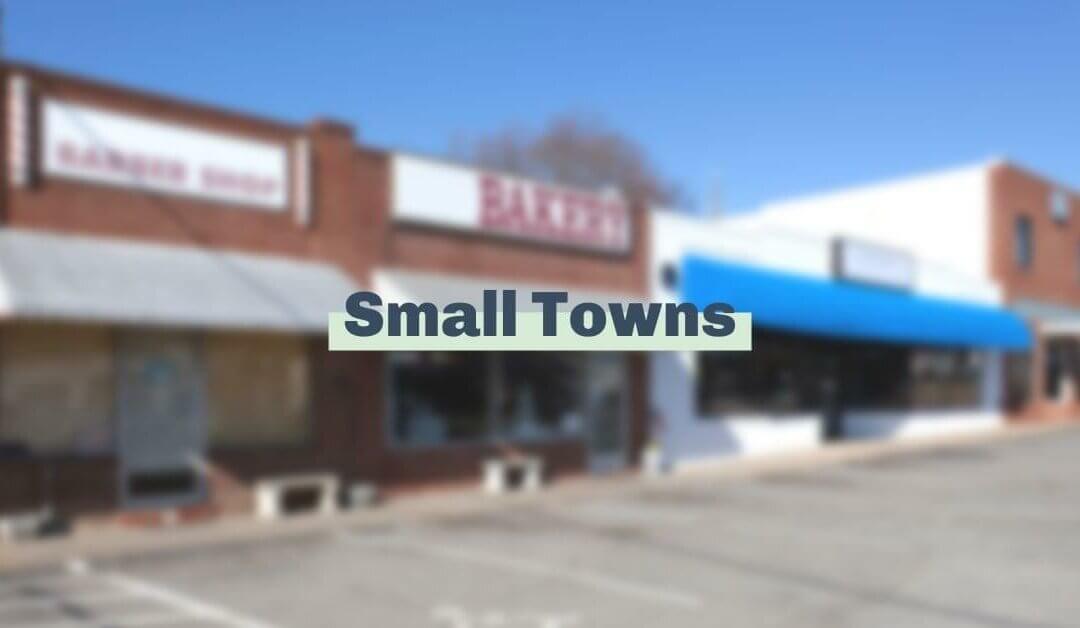
by Allison Kooser | Sep 30, 2021 | +Good Newsletter, The Intro
One of our favorite games to play is buzzword bingo.
You know the drill.
You’re on a call, and someone starts dropping lingo like it’s their job. Synergy. Best practices. Value add. Circle back. Engaging content.
It’s a comedy routine in action.
But every now and then, you hear something that is both a buzzword and enormously important. Something that has the power to both live on a bingo card and revolutionize your business.
Here’s one of our favorites: cultivation.
It’s one of those things that we know is important in theory—but is really hard to define. What is cultivation? What does it mean to cultivate a donor (or even a colleague)? And why does it matter?
For us, cultivation means giving more than you get.
It means providing value, fixing problems, and offering help—independent of what you’ll receive in return.
Cultivation means building a relationship.
In the wise words of Gary Vaynerchuk, it’s the concept of “jab, jab, jab, right hook”—giving, giving, giving, and then asking, instead of constantly making requests.
It’s a posture of generosity—whether that means giving time, stories, information, advice, or entertainment.
And you know what happens as a result? People will like you. They’ll respect you. They’ll value you. And they’ll likely want to give you something in return.
So here’s the tough question for us nonprofit leaders: how are you cultivating your community? Here are some helpful questions to get the ball rolling…
- Are you sending messages that do not have an ask in them? (You should be!)
- Are you asking donors about themselves? Are you genuinely trying to get to know them? (Equally importantly: what are you doing with that info once you discover it?)
- When was the last time you did something nice for a donor (or better yet, a colleague!) just because? With no expectation of reciprocity?
- How can you provide value to your community? What do you have that they want?
Yes, cultivation is a buzzword. But it also matters. Big time. It’s the secret sauce for great donor relationships—and consequently, the magic ingredient for successful fundraising.
Have an excellent cultivation tip or practice? We’d love to hear it! Let us know by commenting below.

by Allison Kooser | Sep 23, 2021 | +Good Newsletter, The Intro
Yesterday, we met a magician.
We had planned to send you a different intro this week—one that we’ll save for a later date. But when we heard Brian Miller speak at the NIO Summit yesterday, we knew we had to make a quick pivot and give you a few key takeaways from his powerful presentation.
First, some background: Brian is a magician. He is an incredible storyteller. He recorded a TED talk that went viral. And he is really really good at helping people connect with one another.
And if we know anything about successful fundraising, it is all about connection.
So in the spirit of sharing what we’re learning as we’re learning it, here are three takeaways from Brian’s presentation yesterday afternoon:
- You will meet 80,000 people in your lifetime. That’s three people a day. Every day, you come across new people, and you have no idea how those people might change your life—or how you might change theirs. How can you be more kind, thoughtful, strategic, and engaging with everyone you meet today?
- The concept of sonder changes everything. “Sonder” is this great word that essentially means “the realization that each random passerby is living a life as vivid and complex as your own.” Wow. That means that in any given interaction, every person involved is experiencing it differently. Every person is bringing their complex human self to the table. Every person has a full set of opinions and thoughts and feelings. And yes, the world does not revolve around you. How might experiencing sonder change your interactions?
- It doesn’t take a lot to make a connection. In his talk, Brian shared a story of a life-changing connection that started with one innocuous comment: “I like your hat.” What a great reminder that your first interaction doesn’t have to be earth-shattering. We get so caught up in saying the right thing that sometimes we miss the opportunity to say anything at all.
We’re at NIO again today—and continue to be inspired by the speakers on stage. We’ll keep sharing what we’re thinking about—and would love to hear the same from you. What is one thing you have learned recently? What is something you heard that struck your interest? Let us know by replying to this email!
And this week, why not test out Brian’s ideas and make some connections? Who knows? Your next life-changing/business-growing/paradigm-shifting relationship could start with “I like your hat”…

by Allison Kooser | Sep 10, 2021 | +Good Newsletter, Gratitudes
This week, we are thankful for…friends who are constantly pushing themselves to grow. Surrounding ourselves with other people who challenge themselves, prioritize learning, and question the status quo helps us do the same. So here’s to our pals—the ones who shove us off the ledge a little bit and help us to fly!

by Allison Kooser | Sep 10, 2021 | +Good Newsletter, The Intro
As you’ve heard us share ad nauseam, we are in a career-long fight to protect our calendars.
Step one was cancelling meetings. Step two was building a schedule that fits your life.
Step three is where it gets hard: How do you guard your time while also being a good teammate? How do you balance your own stuff while also being available when someone asks you for help?
Because this always happens, right? You make a lovely schedule, and then a colleague needs something. You build your list of priorities, and then someone starts adding to it. You fight for margin, and then that margin gets eaten up with requests.
It’s unavoidable—but in our experience, there are several things that can help you maintain your productivity (and sanity) while also helping others:
1. Respond with kindness and understanding.
First things first, be a good human. Be nice. Even if you’re annoyed (and even if you’re going to ultimately say no), treat your colleague/friend/acquaintance/cold email lead with respect. Set the tone for the conversation from minute one.
2. Keep your needs (and yourself) front and center.
Their list is not more important than yours. Their priorities are not more important than yours. They are a person with an idea (yes, even if they are the boss), and those ideas have to fit within your framework. Sometimes, circumstances will require you to drop everything and handle a fire drill, but that should be the extremely rare exception, not the rule. Don’t throw away your autonomy at the first sign of a request.
3. Give what you can, but set boundaries.
Our work culture celebrates helping one another, but it also celebrates saying no. Saying yes to a request that you actually cannot handle is not helpful. Saying yes to something that will overwhelm and exhaust you is not good for the team. Saying yes to more when your own plate is already overflowing is a recipe for frustration, resentment, and poor quality work. So know yourself. Know your boundaries. Guard your time. And know when to say no.
4. Do things on your terms and time.
More often than not, we figure out how to say yes and offer help to those around us—but our yeses come with caveats. Yes, I can help—tomorrow. Yes, I can help—when do you actually need this? Yes, I can help—but I need to prioritize this other project, so can I get this to you next week? Yes, I can help—but I cannot join that meeting. Give yourself the freedom to help without putting yourself in a tough spot.
We aren’t experts—and in so many ways, we’re preaching to ourselves. But if we believe our work, our margin, and our brain space matter, then we have to protect them. So we’re learning how to do just that.
What would you add to this list? How do you balance your own priorities with “hot” requests from others and guard your time? Let us know in the comments!

by Allison Kooser | Sep 4, 2021 | +Good Newsletter, Gratitudes
This week, we are thankful for…small towns. Listen. We are city people. We love public transit, enjoy a diverse selection of food, and have easy access to an airport. Win win win. But there is something really special about small towns. The ones with one stoplight—the ones where everyone knows each other. The ones we escape to for a day or a weekend to move a little more slowly, breathe a little more deeply, and take a pause from our frenetic urban pace. Plus, small towns in Texas often include great BBQ and pie. Bonus.





